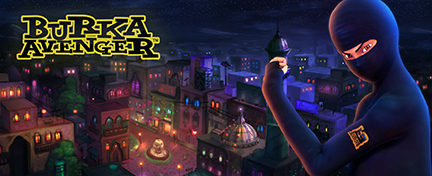
Most of the debate over a Muslim woman who wears the burqa, niqab or hijab centers on how this restricts her freedom of choice. Those who are against the burqa argue that it is a preeminent icon of patriarchy and that societal pressure, valorized with religious rhetoric, does not give a Muslim woman a true sense of choice. The issue is hottest in Western contexts, where a woman wearing a burqa or niqab stands out almost as much as if she was walking around naked. On the other side, there are Muslim women who insist they are exercising free choice and choosing to dress in the conservative manner they want. Regardless of where you stand on the issue, the burqa is inevitably seen as an item that limits a woman’s movement or protects her, not one of empowerment.
So here comes Burqa Avenger to the rescue. This is a video cartoon series in which the star is a female Superwoman/Spiderwoman/Batwoman takeoff, a contemporary way of commanding the right and forbidding the wrong. The series itself is state-of-the-art in its cinematic presentation. You can even get a free app for a Burqa Avenger game on your iphone. As in all cartoons, the characters tend to be stereotypes. Of course, this makes the good stand out from the evil in a stark way that is seldom the case in real life. But the inspiration for the series is to provide young Muslim girls with a positive role model.

At first glance this seems like a sound idea, importing a Western theme and inserting a Muslim character. There are quite a few video games that do this for men. But does it really work? As I watched the online first episode, it seemed like the Burqa Avenger was more like a Halloween witch, flying without the broom but decked out in black, than anything else. It may work as comedy, but I doubt this really empowers women who choose to wear a burqa. If the point is to show that there are tough Muslim women, would it not make more sense to show some real life examples? The make-believe aspect of the Burqa Avenger suggests that it could not happen in real life, like the Kuwaiti women in the wake of Saddam’s invasion back in 1990. The veiled cartoon heroine works as fantasy, but this only serves to reinforce the stereotype that there is a disconnect between the Islamic rhetoric about the value of women and the cultural practices that sometimes do not allow women any choice.

The commercial interest of the site is quite evident. The marketing is clearly for young people who like hip hop, as can be seen in the music videos, which are in English… So here is an in-your-face dj-type saying “Don’t mess with the lady in black, when she is on the attack.” I kind of doubt this will empower young Pakistani girls, but it may scare the hell out of young Pakistani males.